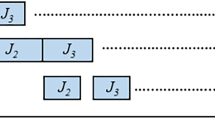Abstract
We consider a scheduling problem introduced by Ahmadi et al., Batching and scheduling jobs on batch and discrete processors, Operation Research 40 (1992) 750–763, in which each job has to be prepared before it can be processed. The preparation is performed by a batching machine; it can prepare at mostc jobs in each run, which takes an amount of time that is independent of the number and identity of the jobs under preparation. We present a very strong Lagrangian lower bound by using the new concept of positional completion times. This bound can be computed in O(n logn) time only, wheren is the number of jobs. We further present two classes of O(n logn) heuristics that transform an optimal schedule for the Lagrangian dual problem into a feasible schedule. Any heuristic in one class has performance guarantee of 3/2. We further show that even the most naive heuristic in this class has a compelling empirical performance. © 1998 The Mathematical Programming Society, Inc. Published by Elsevier Science B.V.
Similar content being viewed by others
References
J.H. Ahmadi, R.H. Ahmadi, S. Dasu, C.S. Tang, Batching and scheduling jobs on batch and discrete processors, Operations Research 40 (1992) 750–763.
J.A. Hoogeveen, T. Kawaguchi, Minimizing total completion time in a two-machine flowshop: Analysis of special cases, in: Proceedings of the Fifth International IPCO conference, Lecture Notes in Computer Science, vol. 1084, Springer, Berlin, 1996, pp. 374–388.
J.B. Lasserre, M. Queyranne, Generic scheduling polyhedra and a new mixed-integer formulation for single-machine scheduling, in: E. Balas, G. Cornuéjols, R. Kannan (Eds.), Proceedings of the Second Conference on Integer Programming and Combinatorial Optimization, Carnegie Mellon University, Pittsburgh, 1992, pp. 136–149.
J.A. Hoogeveen, H. Oosterhout, S.L. van de Velde, New lower and upper bounds for scheduling around a small common due date, Operations Research 42 (1994) 102–110.
W.E. Smith, Various optimizers for single-stage production, Naval Research Logistics Quarterly 3 (1956) 59–66.
Author information
Authors and Affiliations
Additional information
An earlier draft of this paper has appeared in the Proceedings of the Fourth International IPCO Conference, Lecture Notes in Computer Science, vol. 920, Springer, Berlin.
Rights and permissions
About this article
Cite this article
Hoogeveen, H., van de Velde, S. Scheduling by positional completion times: Analysis of a two-stage flow shop problem with a batching machine. Mathematical Programming 82, 273–289 (1998). https://doi.org/10.1007/BF01585876
Received:
Accepted:
Issue Date:
DOI: https://doi.org/10.1007/BF01585876




